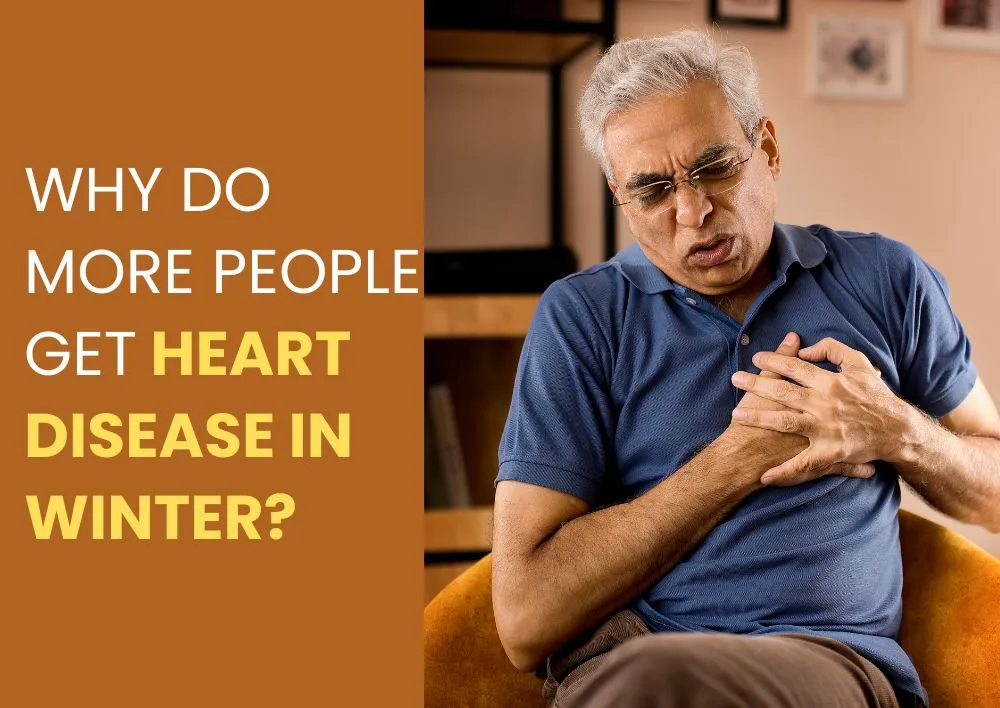Why Do More People Get Heart Disease in Winter?
Heart disease, also known as cardiovascular disease, makes a long shadow over the winter months, affecting a substantial number of individuals. As temperatures drop and a chill sets in, the prevalence of heart-related issues seems to surge. In this blog post, we delve into the reasons behind the alarming increase in cardiovascular disease during the winter season.
Understanding the complex relationship between cardiovascular health and colder temperatures is important. At Miracles Apollo Cradle/Spectra, we recognize the distinct risks that winter causes, especially concerning heart health. Our team of the best cardiologists in Gurgaon takes a proactive approach to addressing these factors. From specialized care to tailored preventive measures, we prioritize your cardiovascular health, offering a comprehensive approach to winter wellness.
Choosing Miracles Apollo Cradle/Spectra, the heart specialist hospital in Gurgaon, means selecting a healthcare partner dedicated to understanding and mitigating the specific risks associated with winter. Your well-being, particularly cardiovascular health, remains our top priority year-round. We are committed to providing the highest standard of care, ensuring you navigate the complexities of winter with confidence and optimal health.
Types of Heart Problems
There are various types of heart diseases, each with its own set of symptoms, causes, and treatments. Here are some common types of heart problems:
-
Coronary Artery Disease (CAD): This is the most common type of cardiovascular disease. CAD occurs when the blood vessels that supply blood to the heart muscle become narrowed or blocked by a buildup of cholesterol and other substances, resulting in a reduction in blood flow to the heart.
-
Heart Attack: Also known as Myocardial infarction, a heart attack occurs when the blood flow to a part of the heart muscle is blocked, usually by a blood clot, and can cause damage to the part of the heart muscles.
-
Heart Failure: Heart failure doesn't mean that your heart has stopped working, but that it is not pumping blood as effectively as it should. Heart failure can result from various heart problems such as coronary artery disease or high blood pressure. Common symptoms include shortness of breath, fatigue, weakness, persistent cough, increased heart rate, and more.
-
Arrhythmias: Irregular heartbeats that can cause your heart to beat too fast, too slow, or irregularly.
-
Valvular Heart Disease: Occurs when one or more of the heart's valves stop working properly, either not opening enough to allow sufficient blood flow or not closing properly, causing blood to leak back into the heart chambers.
-
Cardiomyopathy: The heart muscle becomes enlarged, thickened, or rigid, weakening pumping ability.
-
Congenital Heart Defects: Heart problems present at birth, which may affect the heart's walls, valves, or blood vessels.
-
Rheumatic Heart Disease: A complication of untreated septic sore throat or scarlet fever, which can damage the heart valves.
-
Hypertrophic Cardiomyopathy: It is a genetic condition in which the heart muscle becomes abnormally thick, making it tough for the heart to pump blood.
It's important to note that these heart conditions can coexist or lead to one another. The risk factors for cardiovascular disease include age, family history, smoking, high blood pressure, and diabetes. If you suspect any heart-related issues or heart disease symptoms, it's essential to seek immediate medical care from the best cardiac surgeon near you for proper diagnosis and treatment.
Why is Cold Weather Bad For Heart Patients?
-
Physical Stress on the Heart: One of the significant factors contributing to the increase in heart problems during winter is the physical stress on the heart. In cold weather, blood vessels narrow, making the heart work harder to pump blood and maintain body temperature. For individuals with pre-existing cardiovascular conditions, this added stress can increase the risk of heart attacks and other complications.
-
Respiratory Challenges: The winter season brings respiratory challenges, including colds, coughs, flu, and respiratory infections. These conditions can significantly affect the cardiovascular system, especially for individuals with pre-existing heart conditions.
-
Reduced Physical Activity: During winter, many individuals find it challenging to maintain their regular exercise routines. Cold weather, shorter daylight hours, holidays, and festivities automatically decrease physical activity, leading to increased blood pressure and a potential risk of cardiovascular disease.
-
Dietary Changes: In the winter season, hearty foods are a delight for many but can lead to less heart-friendly dietary habits. High-fat and high-calorie foods, along with a decrease in fresh fruits and vegetables during the cold season, can contribute to increased cholesterol levels and weight gain, possibly leading to heart disease.
-
Vitamin-D Deficiency: Vitamin D is crucial for maintaining heart health as it regulates blood pressure, blood vessel function, and inflammation. Reduced exposure to sunlight during winter can lead to lower levels of vitamin D, and deficiency has been related to an increased risk of heart disease.
-
Dehydration: Cold weather may decrease the sensation of thirst, leading to insufficient fluid intake. Dehydration can increase blood thickness, making it more challenging for the heart to pump blood efficiently. Proper fluid intake is essential for maintaining cardiovascular health and reducing the risk of heart attacks.
By understanding these challenges, individuals with heart conditions can take proactive measures during winter to protect their cardiovascular well-being. Consulting with a cardiologist near you for personalized advice is crucial in managing and reducing the risks effectively.
Signs and Symptoms of Heart Problems
Chest pain stands out as one of the most prevalent warning signs of cardiovascular problems and a potential heart attack. Individuals often describe chest pain as heartburn, a sense of heaviness, tightness in the central chest, or a burning sensation. This discomfort may radiate to the back of the chest, jaw, neck, arms, or the upper part of the stomach.
In addition to chest pain, other common symptoms associated with heart problems include shortness of breath, nausea, dizziness, and excessive sweating. Recognizing these signs promptly is crucial for seeking timely medical attention and addressing potential cardiovascular issues.
If you or someone you know experiences these symptoms, it is recommended to consult with a heart specialist near you immediately. Early detection and intervention can significantly improve outcomes in cases of heart-related concerns.
How To Keep The Heart Healthy During Winters?
Maintaining a healthy heart is crucial for overall well-being, and adopting a heart-healthy lifestyle can help reduce the risk of cardiovascular diseases. Here are some tips to keep your heart healthy during the winter season:
-
Balanced Diet: Eating a well-balanced diet is crucial to reduce the chance of health issues. Consume a variety of fruits and vegetables to ensure you get a range of nutrients and antioxidants. Prefer whole grains such as brown rice, quinoa, and whole wheat over refined grains. Consume poultry, fish, beans, and legumes, and limit red and processed meats. Consume healthy fats such as avocados, nuts, seeds, and olive oil, and limit saturated and trans fats.
-
Regular Exercise: Establish a routine of exercising to improve cardiovascular fitness. Engage in activities such as walking, jogging, swimming, or cycling to enhance cardiovascular fitness. Include resistance exercises to strengthen your heart muscles. Aim for at least 150 minutes per week of exercise.
-
Limit Salt Intake: Reduce the intake of high-sodium foods to manage blood pressure.
-
Maintain a Healthy Weight: Being overweight can increase the risk of developing various health issues. Balance calorie intake to maintain a healthy weight. Regular exercise can also help in weight management and improve overall cardiovascular health.
-
Quit Smoking: Quitting smoking is one of the most important steps you can take to improve heart health.
-
Limit Alcohol Consumption: Excessive alcohol consumption can increase the risk of heart health issues. Limit your alcohol consumption to prevent health issues.
-
Manage Stress: Practice relaxation techniques such as deep breathing, meditation, yoga, or mindfulness to manage stress levels.
-
Adequate Sleep: Lack of sleep can result in various health issues, including cardiovascular conditions. Aim for 7-9 hours of quality sleep per night.
-
Hydration: Dehydration can weaken the heart. Stay hydrated by drinking enough water throughout the day.
-
Regular Health Check-ups: Routine health checkups are crucial for the early detection of health issues. Monitor your blood pressure regularly. Get your cholesterol levels checked regularly, and follow medical advice to manage them. For those with diabetes or at risk of diabetes, keep blood sugar levels in check.
By incorporating these lifestyle habits into your daily routine, you can promote and maintain a healthy heart. It's important to consult with a cardiologist near you to address any specific health concerns and receive personalized advice.
Conclusion:
In conclusion, maintaining heart health is important, especially during the challenging winter months when the risk of cardiovascular issues tends to increase. By understanding the complexities of heart disease and the specific challenges posed by colder temperatures, individuals can take proactive steps to protect their cardiovascular well-being. Prioritizing a balanced diet, regular exercise, stress management, and adequate sleep are essential for promoting heart health year-round.
Miracles Healthcare, recognized as the best cardiology hospital in Gurgaon, boasts a team of expert cardiologists ready to assist you in managing, preventing, and treating all aspects of cardiovascular disease. Miracles Healthcare offers comprehensive healthcare services through multiple facilities: Miracles Apollo Cradle, Miracles Apollo Cradle/Spectra, Miracles Fertility & IVF Clinic, and Miracles Mediclinic. Our facilities are located in Sec 14, Sec 56, and Sec 82, making daily healthcare more convenient for the people of Gurgaon.
If you experience any symptoms of heart issues, take a break immediately when you notice your heart beating faster than usual. We are here to address any questions about conditions that could affect your heart.




_Causes,_Symptoms_Effective_Management_Tips.webp)









Was the information useful?
1 0